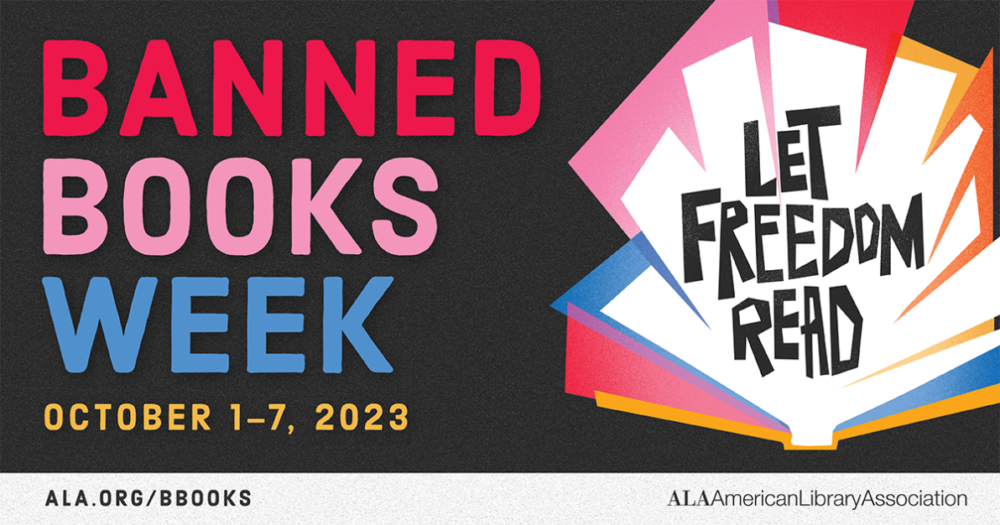In 2023, 3,923 total book titles have been challenged, according to the American Library Association (ALA). This is a 20% increase from the data collected in 2022.

“Banned Books Week is a reminder of how important it is to maintain the freedom to seek and express ideas.” Kathy Reilly, director of New Milford Public Library told me. “It brings awareness that we should be able to choose what to read. It also demonstrates the harms of censorship.”
Despite the claims and popular belief, book banning has nestled its way into our own state. Connecticut was explicitly mentioned in one of the ALA’s Instagram posts regarding book challenges.
A book challenge is the attempt to remove a book from a library, school or university. This doesn’t mean the book is banned, but it opens the process to do it.

“We are seeing book challenges in CT,” Sam Lee, the co-chair of The Intellectual Freedom Committee of the Connecticut Library Association (CLA). “But luckily, most of the time, the book is retained in the collection because of the dedicated work of libraries, library workers and readers.”
“Book bans and challenges can be traumatizing events because identities and communities are being implicitly attacked.”
How To Recognize a Book is Being Challenged
Don’t think your town is immune to book challenges.
“There are organized groups claiming their “parental rights” are being trampled by having inclusive books in library collections,” says Lee. A quick look at the ALA’s top 13 challenged books of 2022 illustrates that most book bans are books that touch on race, gender and sexuality.
“Libraries do not act in loco parentis (loco parentis is the legal obligation of certain institutions like schools to take some parental responsibilities) and no one is forcing anyone to read a book in a library,” Lee continued.
“Librarians are trained professionals that can help parents find books that are right for their family. Just ask, we are happy to encourage curiosity and discovery. We have wide and varied collections that reflect the diverse and different needs of the communities we serve. The parental rights argument is made in bad faith because it ignores the majority of parents that want and need diverse and different books.”
Book bans ultimately give some parents loco parentis over others by robbing them of their right to choose what their child is able to read.
“Anyone can disagree with a book and decide not to read it for themselves, but they do not get to decide for the rest of a community or other parents. They don’t get to eliminate the right for someone else to decide differently. “
What Can You Do?
Book bans and their advocates are not spontaneous reactions. They often come from groups like Moms for Liberty, a conservative activist group dedicated to the banning of certain types of books in the name of parental rights. According to Pen America, 41% of these books have LGBTQ+ themes and characters, and 40% of these books feature protagonists and secondary characters of color.
The agenda in these groups is clear. They are well organized, planned and loud. I was eager to ask Lee what individuals should do to combat this.
“People can help during challenges by providing testimony to school and library boards defending inclusive books. It can be written, spoken or signs displayed and T-shirts worn during board meetings.” — Under the Freedom of Information Act (FOIA) these meetings are required to be free and open to the public. In the age of the Internet, many of these meetings are broadcast on places like YouTube and Facebook as well. — “If people believe in protecting access in libraries, they should run for their school and library boards. Folks can read challenged and banned books for themselves and form their own opinions and encourage others to do the same.”
Because this is a student newspaper, I asked what universities specifically should do to help. Lee had this to say:
“Universities are places that encourage learning and discovery – keep doing that! We need to preserve spaces to talk about the value of having different books, difficult books, necessary books.”
If you see something, say something. Your voice could mean a book is saved from being banned.
In our email chain, Lee added this: “From Mr. Rogers, anything mentionable is manageable, and while there may be difficult conversations elicited by books, it doesn’t mean we should shy away from those conversations. Instead, it’s an opportunity for growth and empathy. Avoiding hard books and conversations makes it shameful. It can be empowering, if instead, folks lean into the discomfort.”


Leave a Reply